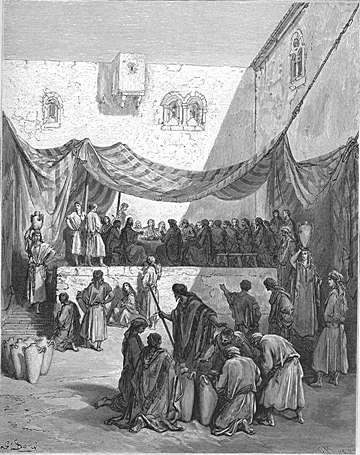Joan 2
1 Eta hereneco egunean ezteyac eguin citecen Cana Galileacoan: eta Iesusen ama cen han
Two days after this there was a wedding at Cana in Galilee, and Jesus’ mother was there.
2 Eta deithu içan cen Iesus-ere, eta haren discipuluac ezteyetara.
Jesus himself, too, with his disciples, was invited to the wedding.
3 Eta faltatu cenean mahatsarnoa, bere amác diotsa, Iesusi, Mahatsarnoric eztié.
And, when the wine ran short, his mother said to him: “They have no wine left.”
4 Diotsa Iesusec, Cer dut nic hirequin emaztea? oraino eztun ethorri ene orena.
“What do you want with me?” answered Jesus. “My time has not come yet.”
5 Dioste haren amac cerbitzariey, Cer-ere erran baitieçaçue, eguiçue.
His mother said to the servants: “Do whatever he tells you.”
6 Eta ciraden han sey kuba harrizcoric eçarriac Iuduén purificationearen araura, çaducatenic batbederac birá edo hirurná neurri.
There were standing there six stone water-jars, in accordance with the Jewish rule of ‘purification,’ each holding twenty or thirty gallons.
7 Dioste Iesusec, Bethaitzaçue kubác vrez. Eta bethe citzaten garairano.
Jesus said to the servants: “Fill the water-jars with water.”
8 Orduan dioste, Eraitsaçue orain, eta ekarroçue mestedostalari. Eta ekar cieçoten:
And, when they had filled them to the brim, he added: “Now take some out, and carry it to the Master of the Feast.” The servants did so.
9 Eta dastatu çuenean mestedostalac vr mahatsarno eguin içan cena (eta etzaquian nondic cen: baina vra karreatu çuten cerbitzariéc baçaquiten) deitzen du sposoa mestedostalac,
And, when the Master of the Feast had tasted the water which had now become wine, not knowing where it had come from — although the servants who had taken out the water knew —
10 Eta diotsa, Guiçon guciac lehenic mahatsarno ona eçarten dic, guero vngui edan duqueiten orduan, gaichtoena: baina hic beguiratu vkan duc mahatsarno ona oraindrano.
He called the bridegroom and said to him: “Every one puts good wine on the table first, and inferior wine afterwards, when his guests have drunk freely; but you have kept back the good wine till now!”
11 Signo hatse haur eguin ceçan Iesusec Cana Galileacoan, eta manifesta ceçan bere gloriá: eta sinhets ceçaten hura baithan haren discipuluéc
This, the first sign of his mission, Jesus gave at Cana in Galilee, and by it revealed his glory; and his disciples believed in him.
12 Guero iauts cedin Capernaumera, bera eta haren amá eta haren anayeac eta haren discipuluac: eta egon citecen han, ez anhitz egun.
After this, Jesus went down to Capernaum — he, his mother, his brothers, and his disciples; but they stayed there only a few days.
13 Ecen hurbil cen Iuduén Bazcoa. Igan cedin bada Iesus Ierusalemera.
Then, as the Jewish Passover was near, Jesus went up to Jerusalem.
14 Eta eriden citzan templean idi eta ardi eta vsso columba salçaleac, eta cambiadoreac iarriric ceudela.
In the Temple Courts he found people who were selling bullocks, sheep, and pigeons, and the money-changers at their counters.
15 Eta eguinic açotebat kordatoz, guciac egotz citzan templetic, eta ardiac eta idiac: eta cambiadorén monedá issur ceçan, eta mahainac itzul citzan.
So he made a whip of cords, and drove them all out of the Temple Courts, and the sheep and bullocks as well; he scattered the money of the money-changers, and overturned their tables,
16 Eta vsso columba salçaley erran ciecén, Ken itçaçue gauça hauc hemendic: eta eztaguiçuela ene Aitaren etcheaz merkatalgoataco etche.
and said to the pigeon-dealers: “Take these things away. Do not turn my Father’s House into a market-house.”
17 Orduan orhoit citecen haren discipuluac ecen scribatua dela, Hire etcheazco zeloac ni ian niauc.
His disciples remembered that Scripture said — ‘Zeal for thy House will consume me.’
18 Ihardets ceçaten bada Iuduéc eta erran cieçoten, Cer signo eracusten draucuc gauça horiac eguin ditzán?
Upon this the Jews asked Jesus: “What sign are you going to show us, since you act in this way?”
19 Ihardets ceçan Iesusec, eta erran ciecén, Deseguin eçaçue temple haur, eta hirur egunez dut altchaturen:
“Destroy this temple,” was his answer, “and I will raise it in three days.”
20 Erran ceçaten bada Iuduéc, Berroguey, eta sey vrthez edificatu içan duc temple haur, eta eta hic hirur egunez altchaturen duc?
“This Temple,” replied the Jews, “has been forty-six years in building, and are you going to ‘raise it in three days’?”
21 Baina hura minço cen bere gorputzazco templeaz.
But Jesus was speaking of his body as a temple.
22 Bada resuscitatu cenean hiletaric, orhoit citecen haren discipuluac, nola haur erran vkan cerauen: eta sinhets ceçaten Scripturá, eta Iesusec erran çuen hitza.
Afterwards, when he had risen from the dead, his disciples remembered that he had said this; and they believed the passage of Scripture, and the words which Jesus had spoken.
23 Eta Ierusalemen cenean Bazco bestán, anhitzec sinhets ceçaten haren icenean, ikussiric harc eguiten cituen signoac.
While Jesus was in Jerusalem, during the Passover Festival, many came to trust in him, when they saw the signs of his mission that he was giving.
24 Baina Iesus bera etzayen fida, ceren harc eçagutzen baitzituen guciac:
But Jesus did not trust himself to them, since he could read every heart,
25 Eta ceren ezpaitzuen mengoaric nehorc testifica leçan guiçonaz: ecen berac baçaquian cer cen guiçonean.
and because he did not need that others should tell him what men were; for he could of himself read what was in men.





















